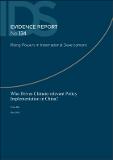| dc.contributor.author | Dai, Y | |
| dc.coverage.spatial | China | en |
| dc.date.accessioned | 2015-05-08T08:46:53Z | |
| dc.date.available | 2015-05-08T08:46:53Z | |
| dc.date.issued | 2015-05 | |
| dc.identifier.citation | Dai, Y. (2015) Who Drives Climate-relevant Policy Implementation in China?, IDS Evidence Report 134, Brighton: IDS | en |
| dc.identifier.uri | https://opendocs.ids.ac.uk/opendocs/handle/20.500.12413/6104 | |
| dc.description.abstract | Climate change is emerging as one of the biggest challenges confronting the sustainability of our planet, affecting the development prospects of both developed and developing countries. There is a global effort to find solutions to reduce greenhouse gas (GHG) emissions, the cause of climate change, by altering patterns of socioeconomic development. Although there is limited progress in international negotiations, there have been sustained efforts by the major contributors of GHG emissions to find solutions to reduce emissions. Since the signing of the Kyoto Protocol in 1992, emerging powers such as China, India and Brazil have joined ranks with the developed economies as leading emitters of GHGs. As a result, emerging literature and policy discourses have started focusing on the role of emerging powers to tackle this challenge. In China, climate policy formulation is centralised and most policy decisions are taken by the national government. Since 2006, the Chinese government has promoted the concept of ‘climate friendly development’. Accepted as a part of the basic national development strategy at the central level, this concept emphasises balancing the twin goals of reducing GHG emissions and preserving economic growth rate. Most existing studies focus on analysing the policy development and formulation at the central level. However, developing a comprehensive understanding of climate change policy requires dealing with aspects of policy formulation as well as policy implementation. In China, there is a great deal of decentralisation in policy implementation. Most of the policy implementation is the responsibility of provincial and city governments. This is where climate-related policies encounter implementation gaps. Yet the local level is less well understood. This study attempts to fill the gap in the existing literature by developing two detailed case studies on renewable energy development from the stage of policy formulation to implementation. The two case studies, on solar photovoltaics and wind technology, examine the role of stakeholder interests in driving or obstructing the implementation of national policies. | en |
| dc.description.sponsorship | UK Department for International Development | en |
| dc.language.iso | en | en |
| dc.publisher | IDS | en |
| dc.relation.ispartofseries | IDS Evidence Report;134 | |
| dc.rights.uri | http://creativecommons.org/licenses/by/3.0/ | en |
| dc.subject | Climate Change | en |
| dc.subject | Politics and Power | en |
| dc.title | Who Drives Climate-relevant Policy Implementation in China? | en |
| dc.type | IDS Evidence Report | en |
| dc.rights.holder | IDS/Tsinghua University | en |
| dc.identifier.ag | OT/11009/5/4/1/185 | |


